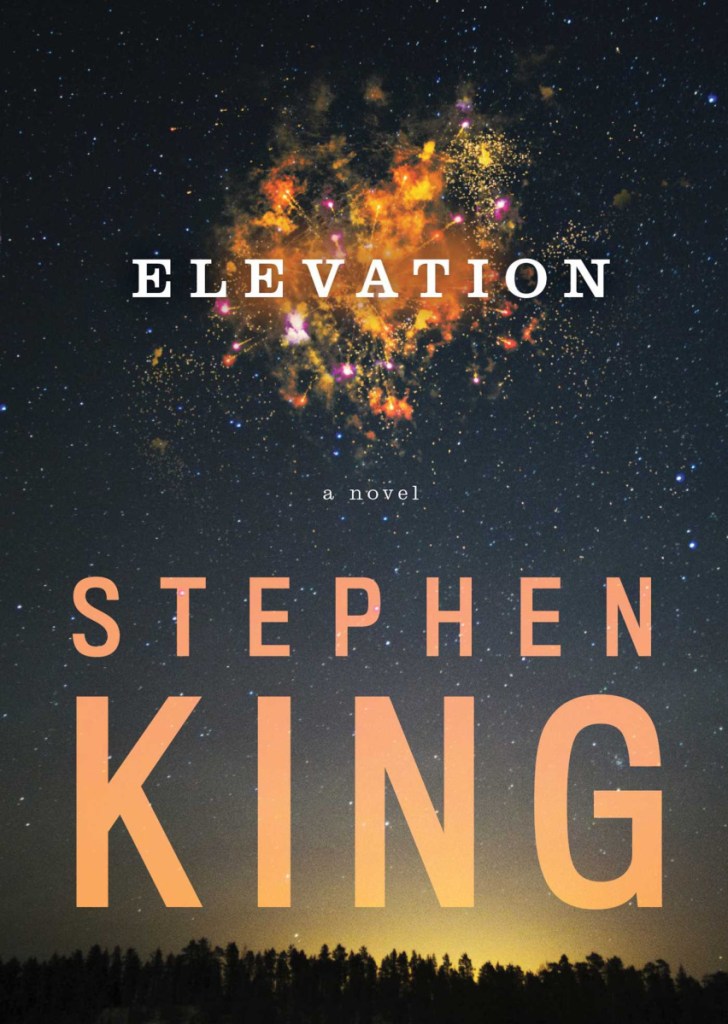“Elevation”
By Stephen King
Scribner, New York, 2018 160 pages, hardcover, $19.95
Along with Stephen King’s newest release, “Elevation,” I also happened recently to read “1922,” which first appeared in the collection “Full Dark, No Stars” in 2010. They’re roughly the same length — both longer and more complex than the typical short story, but much shorter and less densely populated than the typical King novel (even though “Elevation” is a standalone hardcover). But in tone and tenor they’re completely different stories, and all things taken together, I wonder if “Elevation” isn’t a kind of emblem of the late phase of Stephen King’s writing life.
In “1922,” Wilf James, a Nebraska farmer, is writing out in detailed narrative form his confession of the murder of his wife, including his son’s involvement. Wilf’s remorse, regret and self-guilt are so vividly and multifacetedly evoked they’re practically characters themselves. And there’s hallmark King imagery: an extremely grisly murder scene; rats and more rats; bodies rotting in a well; the death of an unborn baby; nightmarish hallucinations. Etc. It’s one of the quintessential Stephen King stories of the descent into psychic hell.
“Elevation” is almost literally the dead opposite. Scott Carey, a reasonably healthy middle-aged guy who lives in good old weird Castle Rock, is losing weight but, somehow, not mass. His doctor has no clue what’s going on, but day after day, Scott’s bathroom scale registers less and less when he steps on it, while his body seems to be not losing, but gaining strength and agility. A subplot develops when a lesbian couple, who have moved into Scott’s neighborhood from New York City to open a Mexican restaurant, of all things, allow their dog to foul his lawn.
One thing leads to another, and soon we are in the middle of a classic backwoods Maine standoff between short-fused, clannish, retributive Mainers and snotty, unconventional city folk. Scott goes out of his way to try to make the conflict right. The characters are so well-drawn they’re, well, comforting. In fact, the overall tone of this story, even amid the conflicts, is warm. The sense of uplift in “Elevation” sharply contrasts with the sense of declivity in “1922.”
Stephen King’s best writing, one might argue, occurred in the 1990s and 2000s. (From this literary view, it’s just a coincidence that his near death in a traffic accident took place in this time period.) I don’t mean “The Stand” (1978) and “Carrie” (1974) are bad books; they’re very good books for what they do. But “Dolores Claiborne” (1993) opens a whole different reach for King, and “Bag of Bones” (1998) and stories like “Hearts in Atlantis” (1999) and “Premium Harmony,” which first appeared in The New Yorker in 2009, and even “1922” are stylistic or storytelling masterpieces within their milieus.
Maybe I’m exaggerating a little bit. But while the storytelling quality of King’s books in the current decade, such as the Hodges trilogy, “Joyland” (2013), even “The Outsider,” is maybe even more refined yet, there is a sense that the darkness of the vision has lightened up. The tenderness between the sympathetic characters feels less edgy, and even the more disturbing events of the more recent stories seem less heavy. The author, in the evening of his career and life, has shed certain of the weights associated with success, maybe, and focused instead on the incredible lightness of being that one finds in the flower of one’s own abilities: “a sense that you had gone beyond yourself and could go farther still.” “Elevation” feels like the literary emblem of that sensibility.
Of course this is all endlessly debatable. There is a case to be made that “The Stand” is Stephen King’s greatest book. Captain Trips and the Wilf Jameses, Brady Hartsfields and other outsiders never disappear. But it seems to me “Elevation” is a creature of a deeper maturity. It might not knock your socks off, but it’s good writing, as William Faulkner put it, that is likely to lift your heart.
Off Radar takes note of poetry and books with Maine connections the first Thursday of each month. Contact Dana Wilde at universe@dwildepress.net.
Send questions/comments to the editors.


